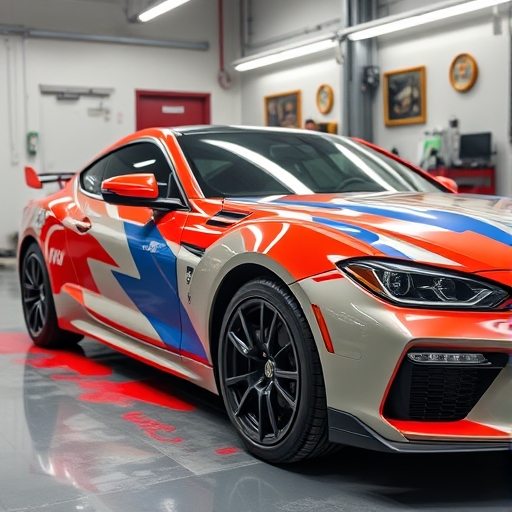How Long Does It Take to Paint a Car?
Painting a car is a significant undertaking that can dramatically improve its appearance and protect its surfaces. However, many car owners often wonder how much time it takes to paint a vehicle. This article will explore various factors that influence the duration of a car painting job and provide a comprehensive overview of the process.
Understanding the Painting Process
Before delving into the time it takes to paint a car, it’s essential to understand the entire painting process. Here’s a breakdown of the steps involved:
1. Preparation: This includes washing, sanding, and priming the car.
2. Masking: Covering parts of the car that should not be painted.
3. Painting: Applying primer, base coat, and clear coat.
4. Drying: Allowing the paint to cure properly.
5. Finishing Touches: Polishing and detailing the car.
Factors Affecting Painting Time
Several factors can influence how long it takes to paint a car. Some of these include:
- Type of Paint: Different types of paint (e.g., water-based, solvent-based) have varying drying times.
- Weather Conditions: Humidity and temperature can affect drying times.
- Type of Vehicle: Larger vehicles may take longer to paint than smaller ones.
- Condition of the Car: Older cars may require more prep work, extending the overall time.
- Experience of the Painter: A professional will likely complete the job more quickly than a novice.
- Time Required: 1-3 days
- Details: This usually includes a single color application with minimal prep work. It’s often chosen for cars that are in decent condition and don’t require extensive repairs or modifications.
- Time Required: 1-3 weeks
- Details: A full restoration involves removing rust, extensive bodywork, and potentially repainting the entire vehicle. This is common for classic cars or those with significant wear and tear.
- Time Required: 2-4 weeks
- Details: Custom paint jobs can include intricate designs, multiple colors, and special effects. The complexity of the design can significantly extend the time needed.
- Time Required: 3-5 days
- Details: This includes basic prep work and a single coat of paint. It’s suitable for those with some experience and basic tools.
- Time Required: 2-6 weeks
- Details: This can involve significant prep work and repairs. It’s ideal for enthusiasts who are willing to invest the time to achieve a professional-looking finish.
- Time Required: 4-8 weeks
- Details: Custom jobs require careful planning and execution, which can significantly extend the timeline.
- Washing: Thoroughly clean the car to remove dirt, grease, and contaminants.
- Sanding: Sand down any existing paint and rust spots to create a smooth surface.
- Priming: Apply a primer to help the paint adhere better.
- Tape and Paper: Use painter’s tape and masking paper to cover windows, tires, and other parts.
- Precision: Ensure that the masking is tight and precise for a clean paint job.
- Base Coat: Apply the base color, allowing proper drying time between coats.
- Clear Coat: Finish with a clear coat for added protection and shine.
- Dust-Free Environment: Ideally, paint should dry in a dust-free environment to avoid imperfections.
- Curing Time: Full curing may take several days, depending on the paint.
- Polishing: Buff the surface to enhance shine and remove any imperfections.
- Detailing: Clean the interior and exterior to complete the project.
- Invest in Quality Paint: Higher-quality paints often provide better coverage and durability.
- Choose the Right Environment: Paint in a controlled environment to avoid dust and moisture.
- Follow Safety Precautions: Use masks and protective gear when handling paint and chemicals.
- Be Patient: Rushing through the process can lead to mistakes and poor results.
- Practice: If you’re a beginner, practice on a scrap piece before applying paint to your car.
Estimated Timeframes
Professional Paint Jobs
For a professional paint job, the time can vary significantly based on the factors mentioned above. Here’s a general breakdown:
| Type of Job | Estimated Time |
|---|---|
| Basic Paint Job | 1-3 days |
| Full Restoration | 1-3 weeks |
| Custom Paint Job | 2-4 weeks |
Basic Paint Job
Full Restoration
Custom Paint Job
DIY Paint Jobs
If you’re considering a DIY paint job, the timeframe will also depend on your experience level and the tools available. Here’s a rough estimate:
| Type of DIY Job | Estimated Time |
|---|---|
| Basic DIY Paint Job | 3-5 days |
| Full DIY Restoration | 2-6 weeks |
| Custom DIY Paint Job | 4-8 weeks |
Basic DIY Paint Job
Full DIY Restoration
Custom DIY Paint Job
The Painting Process in Detail
Understanding the detailed steps involved in painting a car can help you gauge the time commitment better.
1. Preparation
This step can take anywhere from a few hours to a couple of days, depending on the vehicle’s condition.
2. Masking
Masking is crucial to protect areas that should not be painted. This can take several hours, depending on the complexity of the vehicle.
3. Painting
The actual painting process can take several hours to a couple of days, depending on the number of coats and the type of paint used.
4. Drying
Drying time can vary based on the paint type and environmental conditions.
5. Finishing Touches
After the paint has dried, a final polish and detailing can enhance the finish. This can take an additional few hours.
Tips for a Successful Paint Job
If you’re considering painting your car, here are some tips to ensure a successful outcome:
Frequently Asked Questions (FAQ)
How long does it take to paint a car at home?
The time it takes to paint a car at home can range from 3 days to several weeks, depending on your experience, the condition of the car, and the complexity of the job.
Can I paint my car in one day?
While it is technically possible to paint a car in one day, it is not advisable if you want a quality finish. Proper preparation and drying times are essential for a successful paint job.
How long does automotive paint last?
A well-executed paint job can last anywhere from 5 to 10 years, depending on the quality of the paint, environmental conditions, and maintenance.
Is it worth getting a professional paint job?
If you want a high-quality finish and longevity, a professional paint job is often worth the investment. Professionals have the tools and experience to achieve results that may be difficult for DIYers.
Conclusion
Painting a car is a rewarding project that can rejuvenate its appearance and protect it from the elements. While the time it takes to paint a car can vary widely based on several factors, understanding the process and planning accordingly can lead to a successful outcome. Whether you choose to hire a professional or undertake the project yourself, being informed will help you make the best decision for your vehicle.

